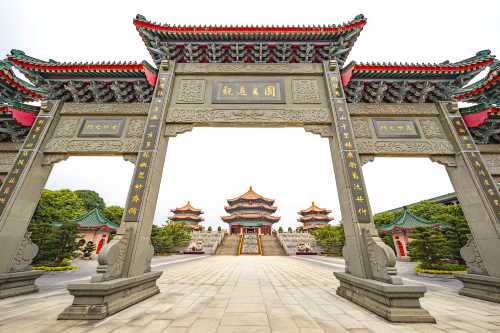Popular Trip Moments
Guangzhou's First Sky Cruise-Themed Park | Guangzhou is really not recommended for June visits because it is just too much fun‼️ | A Holy Land for Family Fun, Photography, and Relaxation! The Ultimate Guide to Guangzhou Ecological Design Town—So Beautiful You Won’t Want to Leave! | What an experience! | Coming here for a birthday is super special!! | Help! The Ultimate Guide to Guangzhou Chimelong Paradise is Here! | Great Date Spot | Terrace Restaurant Perfect for a Light Drink | Here's your guide from Guangzhou to Hong Kong! | Guangzhou Yuyan Academy Back Mountain Light Hiking Guide | Lazy Person's Paradise: Robot Delivery + Instant Check-In! | Guangzhou Luxury Infinity Pool Hotel Recommendation: Rosewood Guangzhou | Caffe Mondo, Sky High Dining with Italian Flair in Guangzhou | A Mountain Park 90% of Guangzhou Locals Haven't Visited | Green Valley Manor, Your Serene Vacation Haven! | Guangzhou Culture Park: Where History Blossoms Amidst Urban Greenery | Yongqingfang, Where Old Guangzhou Meets Modern Charm | Coffeelin, Guangzhou | Mandarin Oriental's in Guangzhou is Stunning😍 | New Guangzhou Spot... A Romantic French Space That Feels Like the Streets of Paris | Chillnow Hotel - A Journey to Guangzhou Baiyun Mountain | Popark Shopping Plaza in Guangzhou | Taikoo Hui mall | Grandview Mall in Guangzhou | 2025 Guangzhou Academy of Fine Arts Graduation Exhibition Phase 3 | Last Few Days, Miss It and Wait a Year | Atour X Hotel near Renhe Metro Station, Baiyun International Airport | OMG, I totally made the right choice with this hotel in Guangzhou! | Park Hyatt Guangzhou | Guangxiao Temple: An Ancient Sanctuary in Guangzhou | Escape to Guangzhou’s Ultimate Water Wonderland | Jungle Meets Ocean – Where Water Thrills Bloom Under Canopies | Guangzhou Nansha City Walk: The Perfect Spot to Enjoy the Sea!!
Trending Travelogues
Recommended Attractions at Popular Destinations
Attraction near Bangkok | Attraction near Manila | Attraction near Tokyo | Attraction near Taipei | Attraction near Hong Kong | Attraction near Seoul | Attraction near Kuala Lumpur | Attraction near Los Angeles | Attraction near Shanghai | Attraction near New York | Attraction near Shenzhen | Attraction near Osaka | Attraction near Singapore | Attraction near London | Attraction near Guangzhou | Attraction near San Francisco | Attraction near Beijing | Attraction near Macau | Attraction near Bali | Attraction near Jakarta | Attraction near Paris | Attraction near Ho Chi Minh City | Attraction near Istanbul | Attraction near Phuket | Attraction near Chicago | Attraction near Seattle | Attraction near Toronto | Attraction near Orlando | Attraction near Cebu | Attraction near Chiang Mai
Popular Attractions
Sha Mian | Sands SkyPark | Ski Dubai | Big Wild Goose Pagoda | Huaqing Palace | Emperor Qinshihuang's Mausoleum Site Museum | Meridian Cruise | Shaanxi History Museum | Dubai Ice Rink | Xi'an City Wall | Chenghuang Street | Tianluokeng Tulou Cluster | Tokyo Disneyland | Minnewater | Elephant Care Park Nai Dee Phuket | U & Me Spa and Massage | Splash 'n' Party Kids Waterpark | Queen Mother Pond | Historium Bruges | Mahadev nagar tubewell (Dadiya) | Masjid Nurul Jannah | Natuurschoon Terheijl | CENTRO POLIVALENTE DELLE ARTI -Mosaico di Andreina | Miejsce rekreacji - "Grzybek" | Pamyatnik Fedorovu V. A. | Aastana e Maheboob e Alam | Golf Du Soleil. Blue Course | Davis Beach | Museo De Marileño | Dameisha Coastal Park
Popular Restaurants in Guangzhou
YUE JING XUAN | The Penthouse | Jiang by Chef Fei | LINGNAN HOUSE | Yue Chinese Restaurant | LAI HEEN | BingSheng Mansion | 广州香格里拉大酒店·东南小馆 | Hong Mian @ The Westin Guangzhou | CHAR bar & grill | Suyab Courtyard | ZI ZHOU LOU | Yue Creative Cantonese Cuisine | Summer Palace | Living Room | La Gallerie @ Sofitel Guangzhou Sunrich | 广州天河希尔顿酒店·IL PONTE意畔意大利餐厅 | Rêver | Howard’s Gourmet Guangzhou | CATCH | CHAO YUE | Yu Yue Heen | RIBS (Shangri-La Hotel Guangzhou) | white tiger | GUANG ZHOU DIM DOU DUK | TIAN BAR | Tou Tou Koi (Zhengjia Plaza) | Sense All Day Dining Restaurant @ Hilton Guangzhou Science City | 秘密旅行xmas(客村店) | Guangzhou Garden Hotel Waterfall
Popular Ranked Lists
Popular Must-Visit Restaurants in Rome | Popular Best Things to Do in Danba | Popular Best Things to Do in Huangshi | Top 3 Best Things to Do in Dongfang | Popular Best Things to Do in Zhuji | Popular Must-Visit Restaurants in Phuket | Popular Best Things to Do in Heze | Popular Luxury Hotels Near Chichibu | Popular Luxury Hotels Near Birmingham | Popular Luxury Hotels in Kieni East | Top 5 Best Things to Do in Danzhou | Top 3 Best Things to Do in Shengsi | Popular Luxury Hotels Near Century City | Popular Luxury Hotels Near Jezerce | Top 15 Best Things to Do in Ganzi Prefecture | Top 3 Luxury Hotels in Al Madinah | Popular Must-Visit Restaurants in Dubai | Popular Must-Visit Restaurants in Santorini | Popular Best Things to Do in Xinchang | Popular Must-Visit Restaurants in Paris | Popular Must-Visit Restaurants in Jeju | Popular Luxury Hotels Near Naxos | Popular Must-Visit Restaurants in Frankfurt | Popular Luxury Hotels Near Etretat | Popular Luxury Hotels in Mirbat | Popular Luxury Hotels Near Owani | Popular Luxury Hotels Near Taean-gun | Popular Must-Visit Restaurants in Shanghai | Popular Luxury Hotels Near Silivri | Popular Best Things to Do in Suifenhe
Payment Methods
Our Partners
Copyright © 2025 Trip.com Travel Singapore Pte. Ltd. All rights reserved
Site Operator: Trip.com Travel Singapore Pte. Ltd.
Site Operator: Trip.com Travel Singapore Pte. Ltd.
















